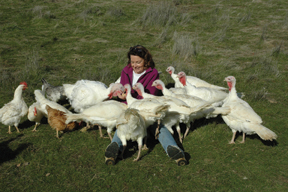Sanctuary Perspectives on “Humane” Animal
Products
People who work with rescued farmed animals at sanctuaries have a unique perspective
when it comes to talking about “humane” conditions of animals
exploited for food. Satya asked a handful of sanctuary founders to share
their views on the growing association of animal rights groups with welfare
reform and how they respond when people ask them about “humane” meat
and “cage-free” eggs.
|
 |
Kim Sturla with Turkeys.
Photo courtesy of Animal Place |
There’s a fear within the animal rights movement
that you can’t
be honest about your ethics—activists worry they’ll be
labeled “radical” or will run afoul of donors or legislators.
But in my experience, when you remain consistent in your belief of
having compassion for all species and convey this message in a non-judgmental
way, the general public and mainstream media do understand and respect
it.
We realize that the transition from eating meat, or even being vegetarian, to
going vegan is not always an easy one. Some people get it right away, and others
take much more time.
Yes, abolition is the ideal, but animal welfare is a positive step, too. Even
the legislative efforts like the recent ban of live field coursing in our county
and the ban on foie gras in California help raise awareness that animals deserve
compassion and respect.
Unfortunately, terms like “humane slaughter” and “humane meat” are
misleading—they’re oxymoronic and give folks the wrong idea. These
terms are marketing ploys designed to make a segment of the public—compassionate
consumers—feel better about buying meat.
Rather than promoting so-called “humane meat” or even cage-free eggs,
I prefer to encourage people to give up meat or animal products one day a week.
If they do, that will have a more lasting impact on them and the animals, and
show how easy it is to enjoy a plant-based diet.
That said, we have Ned Buyukmihci, our co-founder, representing Animal Place
at the table with Whole Foods. He fights for the rights of animals, which, we
hope, results in a level of humane standards that are higher than Certified Humane.
That doesn’t mean I would ever encourage anyone to go into Whole Foods
to buy humanely raised meat. But I would encourage them to shop at Whole Foods
because they surpass most other companies. They are very progressive, as far
as grocery stores go, and what they are doing—such as establishing their
Animal Compassion Foundation and not selling foie gras or live lobsters—is
groundbreaking.
Kim Sturla is cofounder of Animal Place Sanctuary and Education Center in Vacaville,
California, www.animalplace.org; (707) 449-4814.
| |
|
|
© STEALTH TECHNOLOGIES INC. |
|

